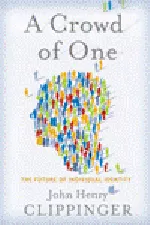
A Crowd of One: The Future of Individual Identity
The individual is not what he or she was. During the Enlightenment, the individual was the antidote to the unruly mob, the locus of rights and freedoms, a check on the power of the state, and the way to unleash the power of the free market. But the Enlightenment trampled over some old truths--the power of the community, a sense of "common stock"--now newly relevant and confirmed by the science of evolutionary biology and social physics.
John Henry Clippinger shows that we are, in fact, much less individualistic that we have been taught. Our personal identity, like our biological identity, is derived from our relationships to others, knowing how to recognize social signals of trust and deceit; security comes not from exclusion or narrow self-interest but a capacity to recognize and embrace mutual self-interest. Social emotions are fundamental to the success of free market success and civil society. The capacity to understand the intentions of others and to find common purpose is at the root of the human evolutionary success.
The hardwiring of our brains has predisposed us to derive a sense of self through our interactions with others; in isolation, a child's growth is stunted, and those qualities we deem most distinctly human--language and empathy--fail to develop. There is no such thing as the noble savage; we are a crowd of one.
Now, identity is again at the forefront of the most important debates of our era. In a rapidly converging world, in which technology is altering territorial and psychological boundaries and escalating the capacity for death and mayhem, how do we detect friend from foe? How can we encourage trust and reciprocity across apparently wide cultural gulfs? Is security to be achieved by ever-increasing surveillance? The force of arms? Can you coerce people to behave better? Clippinger shows how the history of human progress is, in a way, the story of those who have recognized and exploited the human capacity for connections and reciprocal relationships. Social control cannot be imposed from on high; alienation is a group trauma, not just a personal one. Everything we do in our ever more digitized world expresses a connection to others in our society.
How we manage those connections could determine if we are to experience a new renaissance of imaginative thought and creativity or a dark age of tribal rivalry. Clippinger offers a vision for new kinds of post Enlightenment institutions, those that recognize our true natures and are grounded in the sciences. Instead of fearing the digitalization of social, political, and economic relationships and institutions, Clippinger sees an opportunity to move beyond the limitations, waste, and inequities of "free market capitalism" to a new kind of "social commerce," where the "invisible hand" of self interest and "moral sentiments" combine to address a broad spectrum of social, economic, and even ecological issues.
